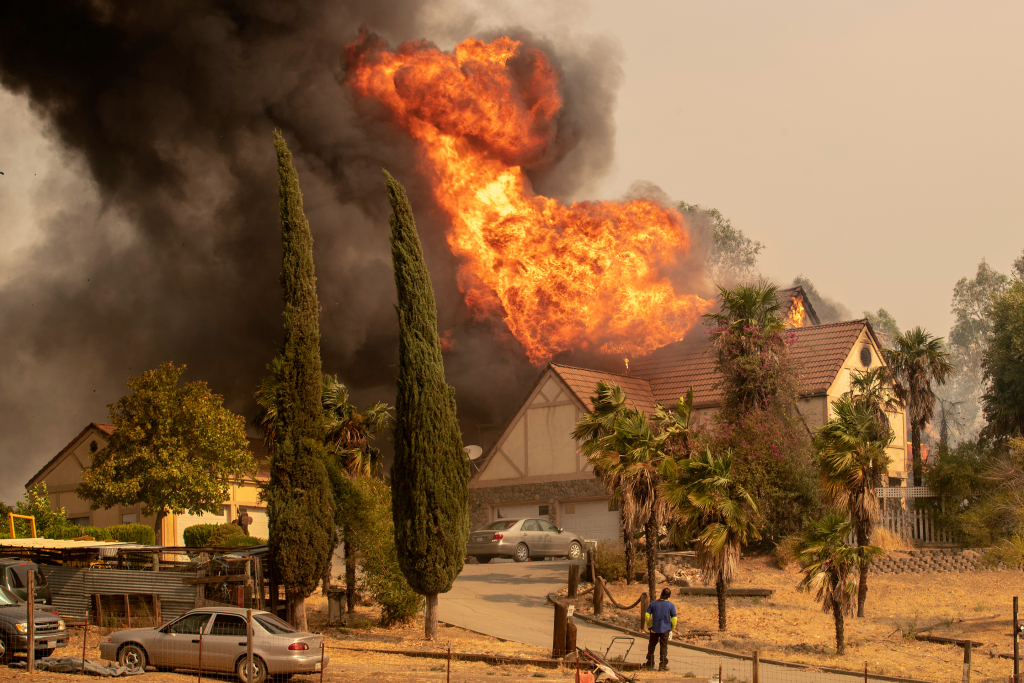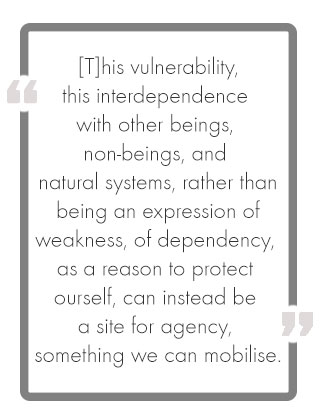
The world is on fire. Australia is alight. Brazil is burning. Indonesia ignites. The cinders of California swirl around tech giants and people on their knees smouldering with defiance. The world is on fire.
During these ‘unprecedented times’, we are frequently reminded of the need to ‘build back better’, improve our ‘resilience’, and overcome our ‘vulnerabilities’. However, perhaps now more than ever, the emptiness of this technocratic rhetoric has been laid bare. Faced with a climate emergency, a global pandemic, and the unimaginable grief of people fleeing disaster, our leaders hide behind these platitudes and transfer their duty onto our shoulders. We are urged to recycle, to ‘eat out to help out’, to volunteer in our communities, while the government dishes out lucrative contracts to its friends and donors and does little to action meaningful policy. Of course, this privatisation of responsibility is a hallmark of today’s neoliberal order. Safety, in the form of a facemask or PPE, is available for purchase on Amazon and comes with free delivery. This ‘cruel optimism’ (Berlant, 2011) leaves us floundering, caught in a system that seems to offer security, equality and intimacy but with its other hand renders these dreams impossible for all but a few. We are encouraged to be resilient, to face life’s challenges, to be prepared, and self-sufficient. Our very personhood is defined in relation to the imminent threat of disaster and thus the need for self-protection, domination, and ownership is paramount. Yet here we are staring down a climate emergency and are unable or unwilling to act.
Lynne Layton (2008) suggests that neoliberal subjectivity is precisely based on this dangerous contradiction, arguing that we live in a heighted state of fear and securitization yet simultaneously deny our vulnerability, which is seen to be shameful, weak and dependant. She characterizes this existence as living in a constant state of manic activity, with an ever-increasing number of new technologies and opportunities for restoration, of course available at a price. Resilience then is framed as a crucial skill for modern life, it eases our journey, mitigates our struggles, allows us to recover following disappointment, but also fosters a false belief that things will be better in the future if we can just make it that far. This rhetoric fills our education spaces too, the UK’s Prevent programme explicitly states the need to develop ‘community resilience’ to extremism, a Public Health England report identifies schools as ‘a key factor in building resilience in the face of adversities such as poverty and family difficulties’ (2014, p.6), and of course the Early Years Foundation Stage identifies ‘resilience’ as a key development goal for young children. However, as Sarah Bracke (2016) argues, the foregrounding of this ‘resilience’ narrative dispossess individuals and communities of a future beyond disaster and threat, it precludes activism and resistance, and instils in us an ever-growing sense of powerlessness. For our children it demonstrates to them that it is better to accept the hand that is dealt than strive for an alternative. As Bracke writes, “Neoliberalism as a hegemonic worldview is generally known to colonize imaginaries and alternatives and the other worlds possible, and subsequently to deprive practices of resistance the oxygen they require.” (ibid:70). Indeed, resilience will not stop climate change, it will not stop this pandemic, war, racism, or any of the other challenges we face now or in the future. So…
Stop calling me
Resilient
Because every time you say
‘Oh, they’re resilient,’
That means you can
Do something else to me.
I am not resilient.
(words of Candy Chang cited from Bracke, 2016, p.71)

What options are available to us then as educators, activists, and parents? Judith Butler suggests that we challenge the neoliberal notion of the sovereign individual, an individual whose sole purpose is self-preservation. She argues that by definition we, our bodies, our minds, are reliant on the shared infrastructure and support, and I would add knowledge, that we create for each other. In other words, your life depends on mine, and my life depends on yours. It is self-evident that as humans we need clean air, clean water, shelter, food, family, friends to survive, and that without these things we are at greater risk of violence or death. She suggests that this vulnerability, this interdependence with other beings, non-beings, and natural systems, rather than being an expression of weakness, of dependency, as a reason to protect ourself, can instead be a site for agency, something we can mobilise. Of course, this vulnerability is not distributed evenly amongst populations nor among places, think of those people who cannot walk down the street without fear of violence, those people who struggle for food, who have been forced to flee their homes, the rainforests, the ice caps, their precarity is acute, their interdependence with the cultural, political and economic structures of neoliberalism have violent implications. Indeed, for many, simply ‘being’, moving, breathing are acts of resistance, of subaltern persistence, which continue to scream “We are still here!” Vulnerability formulated in this way, foregrounds our experiences of being both receptive and responsive, affected and agentic, of listening and of speaking. We must be willing to reveal ourselves, show up, and build platforms of solidarity.
Naturally, this extends to our teaching and learning spaces, we must seek out, nurture and promote vulnerability in classrooms, co-creating and co-discovering ourselves and our interdependence with students. For Paulo Freire this was revealed in the process of conscientização, the term he used to describe the process of becoming conscious of the dominant and often oppressive cultural, political and economic structures which govern and organise social life. In order for this process to happen, Freire noted that the teacher/student binary must dissolve, as such ‘the teacher is no longer merely the-one-who-teaches, but one who himself is taught in dialogue with the students, who in turn while being taught also teaches. They become jointly responsible for a process in which all grow.’ (2017, p.53). Freire describes this new role as being ‘co-investigators’, that is to say the ‘teacher’ and the ‘students’ discover their subjectivities together in the world they have created through and within their learning.

Education in this vein must likewise contend with how, where and by whom dominant knowledge is created and ‘delivered’. A pedagogy of interdependence must, by definition, incorporate ways of understanding the world outside of western frames and values nature on an equal footing to human life. In this way we must engage with non-white, indigenous and non-cisgendered voices, and learn to live in nature not in domination of it, we must embed the knowledge and praxis offered in these spaces into every layer of education discourse and practice, not in a tokenistic nod to the humanity to the ‘other’, but a material change in how we construct and disseminate knowledge. We can forge a pedagogy of solidarity which ‘is about imagining human relations that are premised on the relation between difference and interdependency, rather than similarity and a rational calculation of self-interests.’ (Gaztambide-Fernández 2012, p.49).
For Montessorians the idea of interdependence is not new, it arguably forms the foundation of the practice, underpinning the why and the how of the method. Our aim is to be with children as they discover and explore the world around them and their relationship with it. The materials, the environment, our words, emotions and actions form a constellation of experiences within which the spirit of the child can form. Their coordination develops as they play, their fingers develop dexterity with the materials, their language emerges through conversation, the child’s spirit is interdependent with the relationships, support and infrastructure available in the setting. This notion of Cosmic Education implores us to be vulnerable, asks us to co-discover with the children a vibrant and plural universe, and empowers us to resist the forces which aim to dominate what and how a child should be. Teaching children resilience prepares them for battle, teaching children vulnerability prepares them for peace.
This article was originally shared by Montessori Musings and can be found here

Charlie Cavaliero is currently completing his Montessori diploma in London. Before starting his teacher training he studied for an MA in International Education and Development at the University of Sussex. During his Masters, Charlie specialised in Education in Emergencies and Peace Education, conducting research into the ability of learning to provide residents of Rio’s favela communities opportunities for resistance and reconciliation to violence and conflict. Charlie was drawn to the Montessori Method for its emphasis on Peace and Social Justice, and hopes to integrate Montessori’s ideas into Peace Education programmes around the world.
Reference
Berlant, L. (2011). Cruel Optimism. Durham, NC: Duke University Press
Bracke, S. (2016). Bouncing Back In J. Butler, Z. Gambetti & L. Sabsay eds. Vulnerability in Resistance. Durham: Duke University Press.
Freire, P. (2017) Pedagogy of the Oppressed. London: Penguin.
Gaztambide-Fernández, R. (2012) Decolonization and the Pedagogy of Solidarity. Decolonization: Indigeneity,Education and Society, 1 (1), 41-67.
Layton, L. (2008). What Divides the Subject? Psychoanalytic Reflections of Subjectivity, Subjection and Resistance. Subjectivity 22, pp. 60-72.
Public Health England. (2014). Local action on health inequalities: Building children and young people’s resilience in schools. London: Public Health England